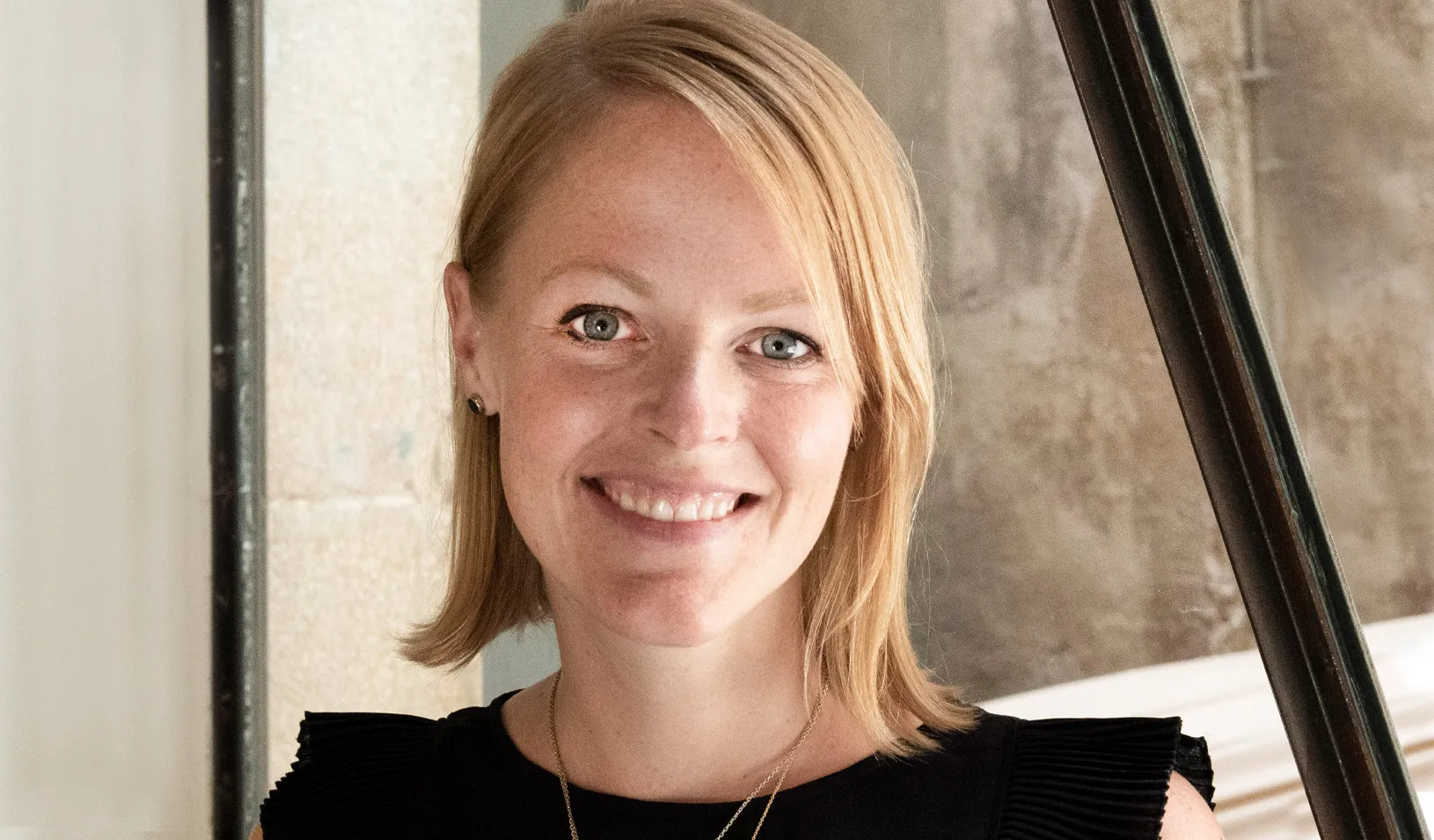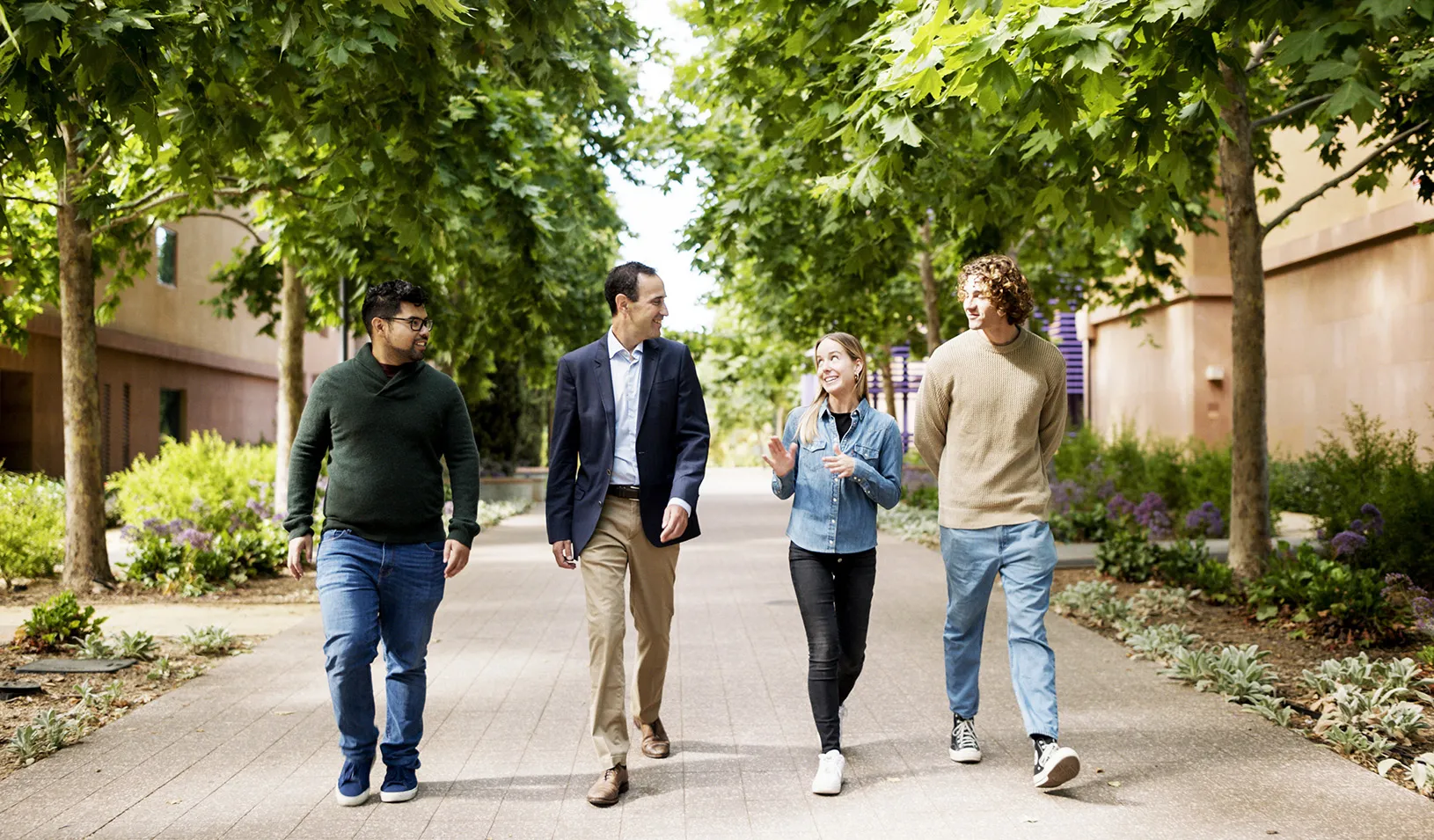Two Stanford MBAs Join Ranks of Stanford GSB Social Innovation Fellows
Rajan Patel and Ronnie Washington have been named 2016 Social Innovation Fellows, joining a select group of emerging social entrepreneurs who have received grants since 2009.
November 09, 2016

2016 Social Innovation Fellows Rajan Patel (left) and Ronnie Washington (right) flank Neil Malhotra, faculty director of the Center for Social Innovation | Stacy Geiken Photography
The two 2016 graduates of Stanford University’s Graduate School of Business have been awarded a stipend and advising support toward the pursuit of their innovative solution to a pressing social or environmental need.
The program’s goal is to give students who want to start social ventures enough time to bring their idea to a funding-ready stage.
“We want them to be focused on their academics while at school, and that doesn’t give them much time to be on the ground to really understand the problems they aspire to address, and to test assumptions,” said Bernadette Clavier, director of the Center for Social Innovation. “Yet when you are looking for funding, foundations and other sources of funding expect the proof of concept.”
A Rigorous Selection Process
“We’re looking for two things, equally balanced: the idea and the person,” said Neil Malhotra, professor of political economy at Stanford GSB and Louise and Claude N. Rosenberg Jr. Director of the Center for Social Innovation. “We’re looking for ideas that are scalable and sustainable. Equally important is whether the student has shown a personal commitment to social innovation and has achieved leadership in the space.”
Washington and Patel’s projects illustrate how fellows tackle problems both in the United States and abroad.
After graduating in June, Washington took just a week off before diving into his new venture, Onward, which aims to provide a financial safety net for workers who struggle to save, and then see their savings wiped out by an unexpected illness or car repair. His idea is to help employers set up programs that will encourage workers to save, offer them access to low-interest loans to deal with emergencies, and promote financial education.
The fellowship is allowing Washington to answer questions about the best structure for the program — what types of workers are the most likely to use it, for example — and to create a pilot program.
Washington spent the summer networking on campus, then relocated to Washington, D.C. He is continuing to benefit from the support of the Stanford network and the coaching that comes with the fellowship.
“I’m a sole founder, and it can feel really lonely sometimes,” Washington said. The staff at the CSI has helped with advice based on past fellows’ experiences.
On the other side of the globe, Patel is using his fellowship year to launch SparkEd, an entrepreneurship and design thinking academy in Bangalore, India. The goal is to help Indian youth develop the creative mindsets that will lead them to start social ventures or become entrepreneurial employees. He got started last year with a pilot program and is using the fellowship to continue his work.
The fellows who came before Washington and Patel offer inspirational stories and valuable lessons.
“An impressive number of them have been successful with their ventures,” Clavier said. Others have used the experience to move into other careers related to social innovation. The Center for Social Innovation has kept in touch with all of the fellows and is now able to get their feedback on what students need to know to be successful. “What we’re trying to create through this program are social entrepreneurs who are also systems thinkers.”
Previous Fellows’ Work Illustrates a Wide Range of Social Problems
Joice Toyota, MBA/MA Education ’15 and a fellow in 2015-16, cofounded Vetor Brasil, a nonprofit that works to develop talent in Brazil’s public sector. “I’m interested in this work because I believe government plays a key role in fighting social inequality in my country,” she said.
Gayatri Datar, MBA ’14, spent her 2014-15 fellowship starting EarthEnable, which sells and installs earthen floors in homes in Rwanda. The goal is to replace dirt floors, which are associated with poor health, without using expensive cement.
“The Social Innovation Fellowship provided critical support throughout the application process, including invaluable pitch coaching and feedback on our business plan,” Datar said. “Beyond the financial support that came with the fellowship was a vote of confidence in our idea and our ability to execute on it.”
Laura Weidman Powers, JD/MBA ’10 and a 2013-14 Social Innovation Fellow, worked on Code2040, which aims to create a pipeline of students of color in computer science and STEM fields.
“I appreciated the support from CSI, both financial and also the access to coaching and resources,” Weidman Powers said.
Weidman Powers recently began a six-month stint as the senior policy advisor to the U.S. CTO in the White House Office of Science and Technology Policy. She will return to Code2040 full-time once her White House post is over.
Clavier cites Weidman Powers’ appointment as a prime example of how fellows can have influence beyond their individual ventures.
“Scaling impact is a team sport,” Clavier said. “It requires influencing others outside your own organization; it may involve crafting new policy; it’s all about aligning actors and re-engineering systems.”
Brenden Millstein, MBA/MS ’10, is CEO of San Francisco-based Carbon Lighthouse, a social enterprise with for-profit and nonprofit divisions.
“My work as a fellow was growing Carbon Lighthouse so organizations could profitably eliminate their carbon footprint,” Millstein said of his 2011-12 fellowship. Carbon Lighthouse’s for-profit entity is a clean energy company whose technology makes energy efficiency in buildings 10 times more cost effective than before.
The for-profit entity donates a portion of its proceeds to the nonprofit, which uses these and other donations to compete with power companies for pollution permits in 10 different states. This forces the utilities to turn to cleaner sources of energy. Since the launch in 2010, the two entities combined have eliminated the emissions of three power plants.
Reid Saaris, MBA/MA Education ’10, used his 2010-11 fellowship to found Equal Opportunity Schools. The social enterprise has worked with more than 100 school districts in 20 states to help ensure equal access to Advanced Placement and International Baccalaureate classes for students of color and low-income students — students who are often “missing” from advanced classes.
“Finding missing students has a direct impact on their readiness for college, but it also has a secondary impact on the system,” Saaris said. “So much of the national dialog has been about gaps and deficits. But when students are challenged at a higher level, they will rise to the level of expectations.”
Clavier noted that although this particular program is focused on students who want to found a new organization, the broader CSI and Stanford GSB provide pathways for students interested in joining already existing efforts whether in social enterprise, philanthropy, impact investing, nonprofit management, public service, or responsible business. The Center educates insightful leaders for social and environmental change and provides students with the awareness, skills, networks, and opportunities they need to start making a difference in the world.
— By Margaret Steen
For media inquiries, visit the Newsroom.
Explore More
Erin Nixon Joins Stanford GSB as Assistant Dean of Admissions

Nia Rose Froome, MBA ’23: Making Local, Fresh Food Available for All

New Research Fund Promotes Responsible Leadership for the Next Century
